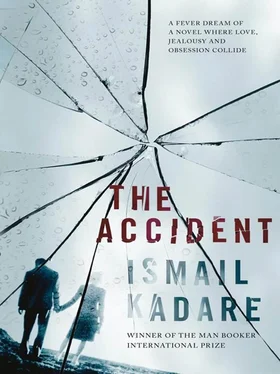Go on, she thought. Don’t lose your thread.
Of course, it was already late for them. But he particularly wanted to avoid this kind of end. He did not want to enter that twilit world. He wanted to find another path, while there was still light. Perhaps we should interpret the descent of Orpheus into hell to bring back Eurydice in a different way. It was not Eurydice that died, but their love. And Orpheus, trying to bring her back, made a mistake. He was in too much of a hurry, and he lost her again.
It was you who told me that love is problematic in itself, she thought. A long time ago he had said: “There are two things in the world that are in doubt: love and God. There is a third thing, death, which we can only know through seeing it happen to other people.”
Two years before, at the height of her affair with Lulu, he had forgiven all her harsh words, because she had seemed to him insane. Now she would do the same for him. He seemed exhausted, and of course his nerves were in a bad way.
In the hotel, after dinner, he had eyed the receptionist suspiciously as he asked, “Is there any message for me?”
“Who are you expecting a message from?” she asked.
He smiled. “I’m expecting a summons. A court summons.”
“Really?” she said, trying to maintain the same tone of mockery.
“I’m not joking. I really do expect a summons. To the Last Judgement, perhaps…”
He avoided her eyes in the elevator mirror.
“They’ll find me in the end,” he said softly.
“You’re tired, Besfort,” she said, leaning her head on his shoulder. “You need to rest, darling.”
In bed she tried to be as loving as she could. She whispered words of endearment, some of them laden with the double meanings that he enjoyed so much before lovemaking, and then, after he sank exhausted beside her, she asked in a very quiet voice: “What was it you said… your ex-wife?”
His reply came in the same breath as his final sigh.
“Sublime,” Rovena repeated to herself.
Increasingly his thoughts reverted to the strange taste of their first meeting after the episode with Liza. He knew that something had happened, but could not tell what, especially not that a woman had come between them.
Under the pale illumination of the lampshade, her face sometimes looked as strange and inscrutable as it had then. The hope of experiencing that feeling again was like waiting to recapture a dream of incommunicable sweetness, of the kind that other, gentler worlds seem to grant only once to a human life, and then purely by chance.
Evidently Liza had been part of the transition that was vital to the creation of this strange zone.
“What did you think?” asked Rovena, about when he interrogated her on the subject of Liza.
He tried to laugh it off, and said, “Nothing,” but she was no longer smiling.
“You’re still hiding something from me,” she said in a weary voice. “Don’t you think you’re going too far?”
“Possibly. But I don’t feel guilty about it.”
He said he didn’t feel guilty because, however secretive a man was, or pretended to be, he would always be an amateur compared to a woman.
“Women are the soul of secrecy and, like it or not, so are you,” he whispered, caressing her below her belly. “Nobody, not even a woman herself, can ever know what is hidden behind that silent entrance. Unless the gypsy woman’s eye can see it.”
As she listened, she suddenly remembered the girls’ lavatory at school, where someone had scrawled, “Rovena, I’m dying for your c-.” Shocked, she had gone back to the classroom, totally unable to guess which of the girls might have written it. Perhaps this one, and then perhaps another. After each suspicion came the same question: how could this other girl know about her private parts? Nobody had ever touched them, or even seen them, apart from her mother. She had hurried to the lavatory again in the next break, but the writing was gone. On the roughly whitewashed door a piece of paper was pinned, “Wet Paint.”
“Don’t think I’m trying to be mysterious,” he said, stroking her hair. She kissed his hand. Oh no. He didn’t need to try, he just was.
Hidden under the coat of paint, the scribble seemed much more threatening, and as she returned to the classroom she felt her knees give way.
He promised that this mystery would pass and that next time they met everything would be clear.
“You always put off everything until next time,” she complained. “Do you really expect a summons? Is nothing really the same as before? At least tell me that.”
He did not reply at once. He touched her hair, and strands fell over her eyes like a veil. In a clear voice he said that this was the truth.
Thirty-three weeks before. Liza, according to Besfort.
All the reports claimed that Besfort was in Tirana thirty-three weeks before the accident. The few opulent skyscrapers belligerently reflected the summer light off one another. As he walked through the once forbidden neighbourhood, unable to decide upon a café, it seemed to Besfort Y. that the very glass of the buildings expressed the city’s malice and its troubled conscience, as vented every morning by the newspapers. Lawsuits, grudges, debts, unsettled feuds that bided their time – they were all there.
He stopped hesitantly outside the Café Manhattan, weighed up its neighbour and, without further thought, entered the Sky Tower.
The view from the enclosed terrace on the sixteenth floor was beautiful at any time of year. From this height, the journalists’ speculations seemed more credible: the owners of the first four storeys of the Sky Tower, including the café where Besfort was sitting, were fighting a court case with the state. At the foot of the tower were the foundations of another skyscraper, whose builders were in conflict with the landowners, the city council and the Swiss Embassy, on whose land they were accused of encroaching. A little further on was a statue, also a subject of dispute, involving historical symbols and, indeed, indirectly, the clash of civilisations and the attack on the twin towers in New York.
Besfort Y. could not suppress a sigh. Then he heard a mixture of Albanian and German from the next table.
“Albania wears you down,” a friend of his had said, after leaving for Belgium in 1990. “She drives you to despair and sends you round the bend, but there’s no escaping her.”
They both thought the same. The more you insult the place, the more it tightens its grip on you. It’s like the love of a whore, said his friend.
Rovena was back in Graz. She had managed to extend her stay for the third time. “For your sake,” she said on the phone.
He looked out of the corner of his eye at the next table. One of the foreigners might be the “bi”. Besfort stared at his chin and the reddish curls at his temples, considering if this man had really slept with Rovena. My darling, he said to himself. How had she put up with all of that?
A wave of longing gently enveloped him. He must get down to writing that letter he had promised her when they last met.
There was movement at the next table, and heads turned towards the window. Besfort looked in the same direction. The columns of traffic in both directions had been halted on the main boulevard. Someone pointed out a crowd that formed a dark mass on Mother Teresa Square.
“Another demonstration,” said the waiter, removing the ashtray. “They want their property back.”
The placards bobbed white but illegible above the crowd. In front of the prime minister’s office, a second row of helmeted policemen quickly lined up.
Besfort ordered a second coffee.
He had better write that letter soon, he thought. A letter and two or three phone calls would discharge most of the tension. Liza’s name, mentioned so often in Vienna, was a suitable peg on which to hang the broken thread of their dialogue.
Читать дальше












